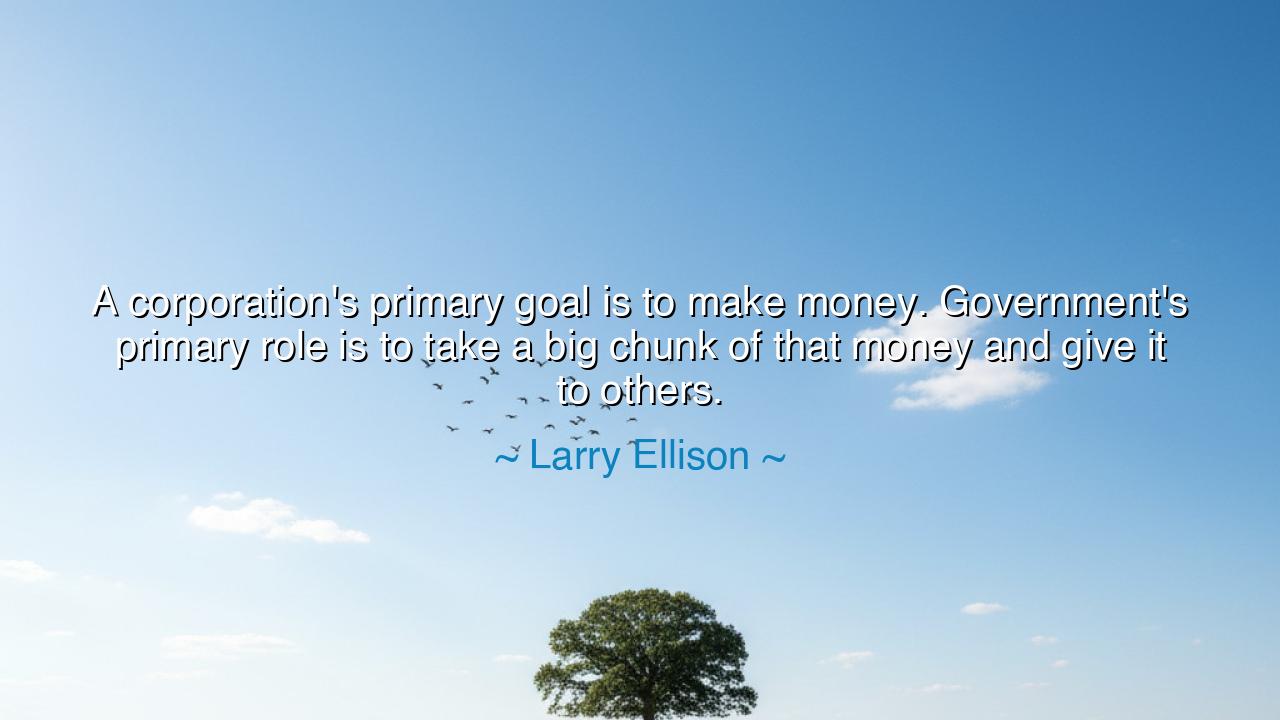
A corporation's primary goal is to make money. Government's
A corporation's primary goal is to make money. Government's primary role is to take a big chunk of that money and give it to others.






In the voice of both irony and truth, Larry Ellison, the architect of one of the world’s greatest empires of technology, once declared: “A corporation’s primary goal is to make money. Government’s primary role is to take a big chunk of that money and give it to others.” These words, though wrapped in wit, speak to a profound and ancient tension — the eternal struggle between wealth and power, between the makers of prosperity and the keepers of justice. Ellison, a man who built Oracle from the dust of ambition, understood deeply the nature of enterprise. Yet he also saw the machinery of the state, vast and hungry, moving to redistribute what it did not create. His quote is not a complaint, but an observation — a mirror held up to civilization itself, where the balance between creation and obligation forever defines the fate of nations.
The origin of this truth lies in the dawn of trade, when the first merchants ventured forth with goods and the first rulers levied their taxes. From that moment, two great engines began to shape human destiny: the market, which produces wealth through innovation and labor; and the government, which claims a portion of that wealth to maintain order, justice, and welfare. Ellison’s statement captures this ancient dynamic in modern form. He speaks as a man of enterprise, whose hands have built fortunes through the logic of profit and competition. Yet, he also acknowledges that the government — the overseer of society — takes from this private abundance to sustain the collective good, sometimes wisely, sometimes wastefully.
In this, Ellison’s quote is both critique and reflection. He reminds us that corporations, by their very nature, are not moral beings; they are instruments of efficiency and ambition. Their purpose is not to heal the sick or uplift the poor, but to create value — and in doing so, to enrich those who take risks and labor in their service. The government, on the other hand, claims the moral mantle — it stands as guardian of equity, provider of public goods, and protector of the weak. But Ellison’s irony points to the danger of imbalance: when the hand that takes becomes heavier than the hand that creates, when the redistribution of wealth overwhelms the generation of it, prosperity falters, and resentment takes root.
History bears witness to this truth. In the late Roman Empire, emperors imposed crushing taxes upon merchants and farmers to feed the machinery of the state and appease a restless populace. What began as noble intent — to maintain peace and welfare — became a burden that strangled the economy. Trade withered, innovation died, and the empire’s coffers, though filled for a time, soon emptied into ruin. Rome forgot the balance between enterprise and governance, and in doing so, it collapsed under the weight of its own generosity. Ellison’s words, though born of modern capitalism, echo the lessons of that ancient fall: a nation cannot thrive when those who build are punished for building.
Yet there is another side to his wisdom — a reminder that government exists for a reason. Without law, there is no trust; without trust, there is no market. The state, imperfect as it is, ensures the roads upon which commerce travels, the justice that guards property, and the peace that allows ambition to flourish. The redistribution Ellison mocks is not wholly unjustified; it is the price of civilization. But when the balance tips too far — when the government’s role becomes more about taking than protecting, more about control than stewardship — then the flame of enterprise begins to dim. For no man will toil endlessly when the fruits of his labor are claimed by others in the name of fairness.
Consider the story of Andrew Carnegie, the great industrialist of the Gilded Age. He built immense wealth through steel, yet in his later years, he gave much of it away — building libraries, schools, and foundations. He believed that it was not the duty of government to seize and distribute wealth, but the responsibility of the wealthy to use it wisely for the common good. His life stands as a bridge between Ellison’s two worlds: the creator who makes, and the benefactor who gives. Carnegie’s voluntary charity succeeded where coercive taxation often fails, for it sprang from choice, not compulsion.
The lesson, then, is not to despise either the corporation or the government, but to seek harmony between them. The maker and the guardian must walk together — one generating the energy of innovation, the other channeling it toward justice and stability. But neither must forget its role. The corporation must never claim virtue while serving only profit; the government must never claim righteousness while draining the well of creation dry. The health of society depends upon their balance — upon freedom tempered by responsibility, and ambition restrained by wisdom.
So, my child of the marketplace and the republic, remember this: wealth alone cannot save a nation, nor can charity alone sustain it. Let your enterprise be bold, but let your heart be just. Create without greed, govern without envy. For as Larry Ellison reminds us, the world will always be shaped by those who make and those who manage — and the greatness of a civilization lies in ensuring that neither destroys the other.






AAdministratorAdministrator
Welcome, honored guests. Please leave a comment, we will respond soon